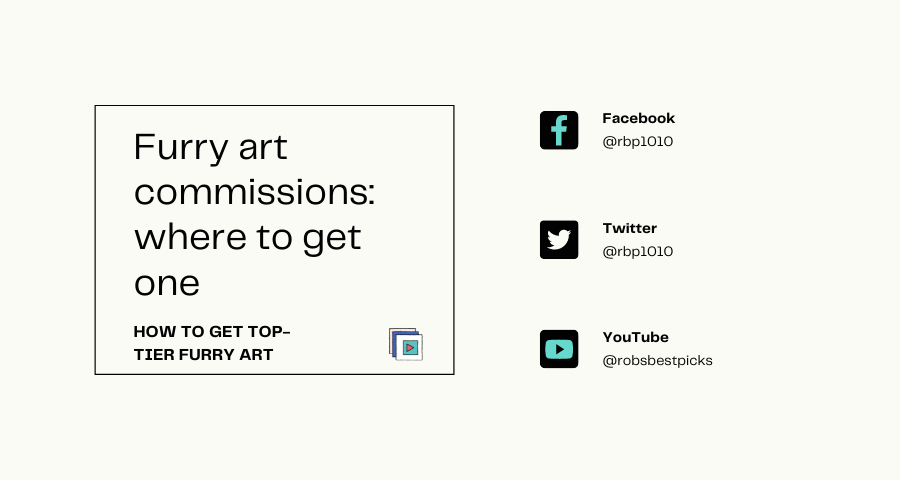Creating the right content to engage your users is tough work. Most business owners struggle with it, and only a few ever master what’s now a revered art form. Reasons why many outsource content development to third parties.
But where would you find the best content developer for your business needs? Freelance? Agency? Or maybe hire a dedicated content developer in-house? Let’s dive in to see what you stand to gain (or lose) if you went with either a freelance, agency or in-house content writer.
What are your content writing needs?
Before we continue, answer this question, what are your content writing needs? Your answer will go a long way to determine the content development faucet that’s best for you. You’ll get to understand why this is the case as I go through all three content development methods available for your business.
Are you an eCommerce business owner looking to pull in organic traffic via your blog site?
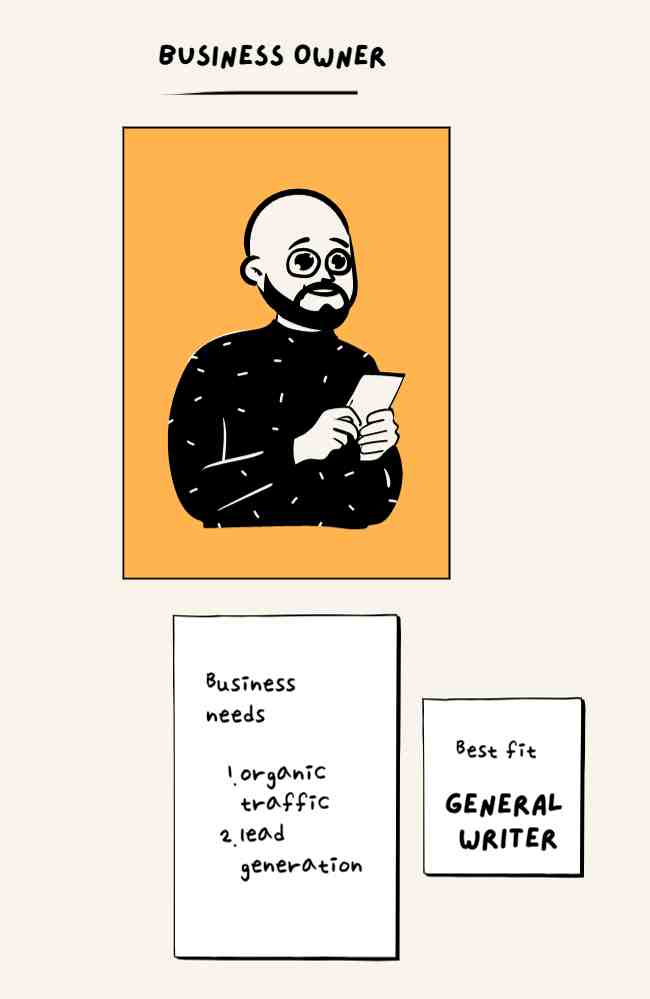
Any good writer available for hire can piece up well-grounded blog posts on a whim.
Are you looking for a copywriter with in-depth knowledge of a specific industry to populate your websites’ pages?
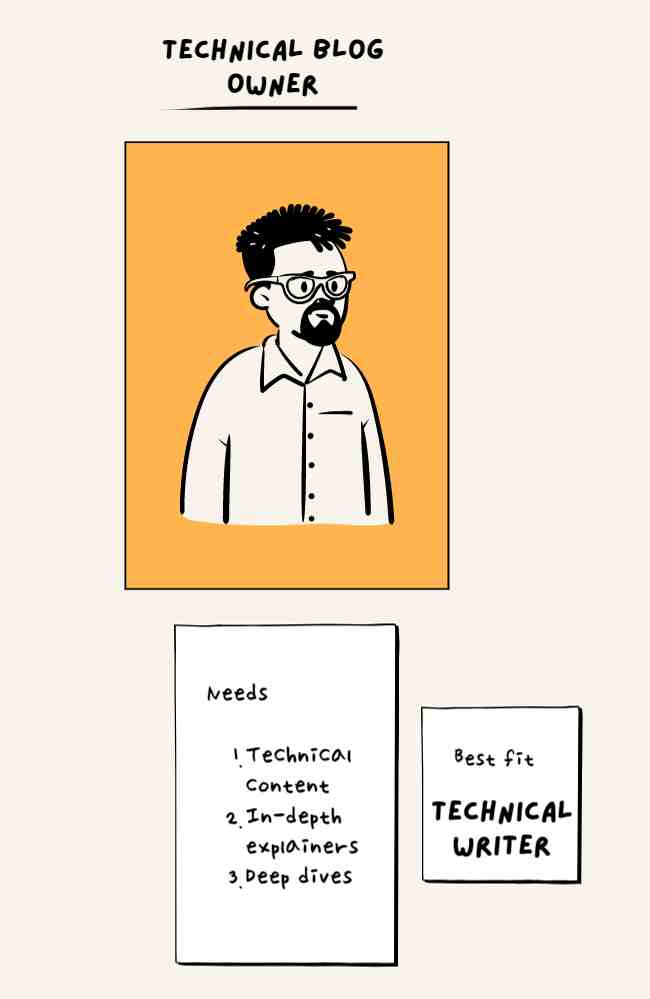
Specialty or technical writing requires foreknowledge or experience in the sector in question. If you want good, technical copy for your website, you need someone technical who can write good copies, not someone who’s excellent at writing good copies but with limited technical knowledge. There’s a difference.
Are you looking to communicate a specific brand tone and voice?
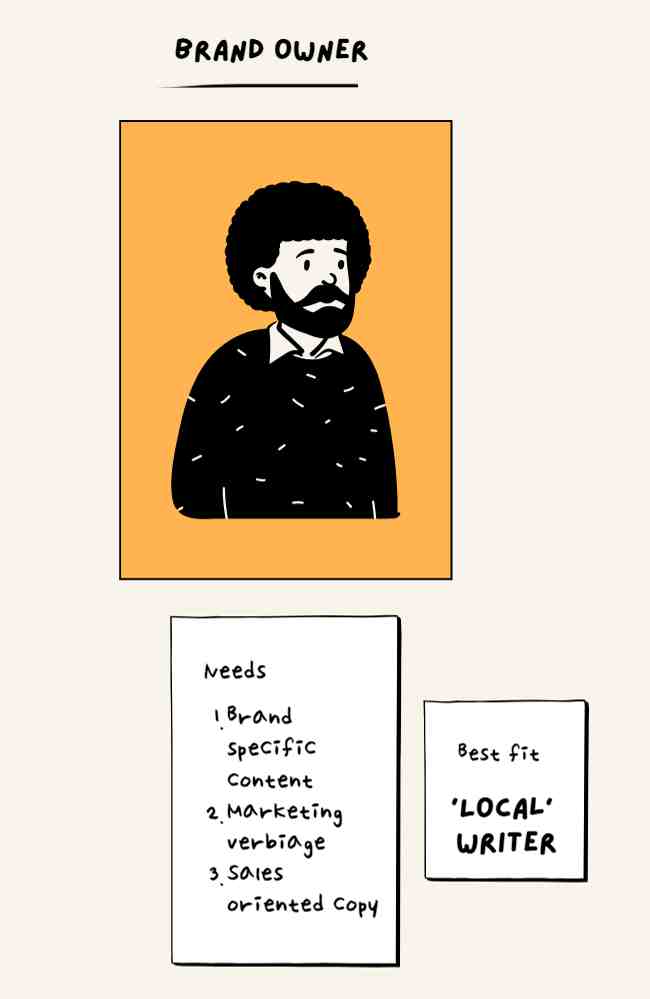
It can be hard to find someone who sounds like you or your brand. Keep that in mind as you surf for a content writer. The majority of the writers you’ll meet will have a tone of theirs. Usually, the closer home (in terms of your geographical location and industry/niche) you hire, the better the chances that your writer will resonate with your brand voice.
What does it mean for a writer to be freelance, agency, or in-house?
All are writers alright, what sets them apart is how they interface with your business.
In house writer
An in-house writer is a writer you employ full-time with benefits to develop written content exclusively for your business.
Freelance writer
A freelance writer is a writer for hire available on a contract, with that contract usually being short-term. Freelance writers are not full-time employees.
Agency writers
Agency writers are full-time writers who work for a writing agency but are available for hire on a freelance basis to business owners.
In-house writer vs. freelance writer vs. agency writer
As I said, all are writers but generally speaking, each category comes with its own peculiarities
What are the advantages of hiring an in-house writer?
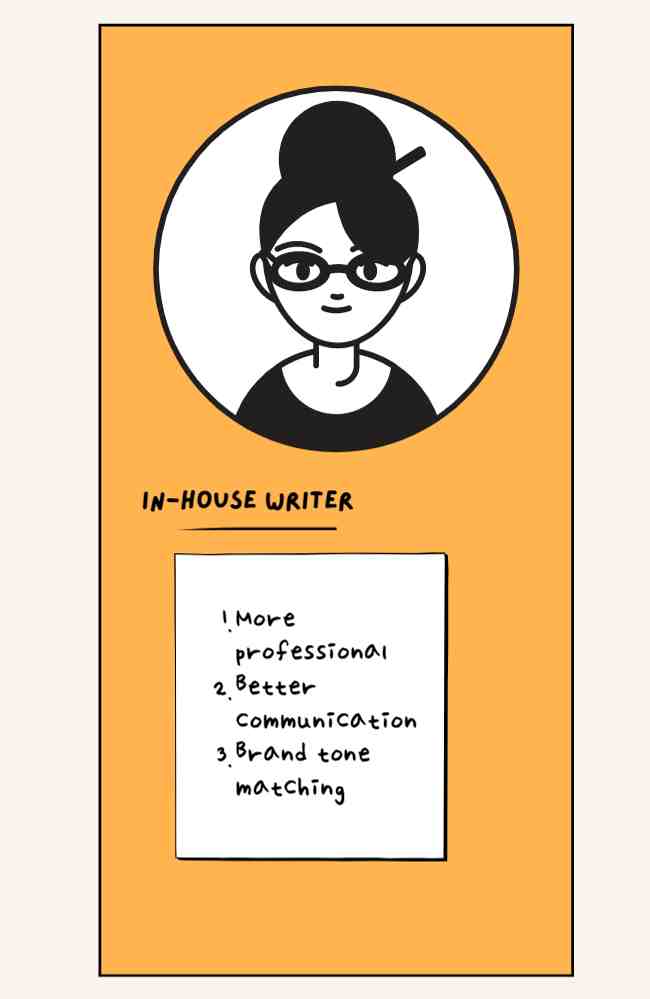
In-house writers are mostly seasoned professionals
I mean, you wouldn’t hire an unqualified writer then hand them a fat check for the mere sakes of hiring, right? Most in-house writer roles get filled by writing professionals because the requirements and expectations are high.
Usually, businesses that hire this category of writers only on-board people with stellar recommendations or who have demonstratable evidence of their proficiency in writing.
Professionalism here also extends to how these writers conduct themselves. So, except in rare circumstances, you wouldn’t be dealing with missed deadlines, shoddy communication or poor adherence to writing prompts, and so on.
Full-time means full-time for your business needs
One of the standout benefits of hiring an in-house writing professional is that you get a writer who’s exclusively focused on you and your business – no side distractions, just full-on commitment to satisfying your writing needs.
If you’ve worked with freelance writers before, you’d understand why this is important. Writing, like other creative arts, requires concentration and focus. When a writer is not juggling four business writing tasks at once, it’s easier to develop a clear writing path and headspace for excellent and engaging copies. And talking about engaging content:
In-house writers are better positioned to create copies that resonate with your brand
Because they connect with your business and eventually go on to learn the ropes and other subtleties, full-time writers are the best bet if you’re trying to create engaging copies or marketing content that appeals to your consumers.
It’s simple, really; they know the business, they know how the business wants to sound and, if your marketing/sales team is doing their job well, they’ll also get communication on the pain points of the target consumer. This is the recipe for creating engaging, leads driving, and conversion-optimized content.
There’s less friction in terms of communication and connecting
When your writer is in-house, communication is direct and mostly in person. Effective communication between you, your writer, and anybody else involved in the business content development cycle is another critical ingredient in the recipe for creating quality content.
With in-house writers, there are no time zone differences or communication channel problems present with other routes of content development that might stifle effective communication.
What are the disadvantages of hiring an in-house writer?
It’s expensive to keep a writer in-house
An in-house writer will command a full-time salary with full-time benefits, and oh, add taxes to that too. In the United States, for instance, you’re talking about paying in the $60,000 – $80,000 to keep a writer tied down to your business. That’s an expense many entrepreneurs and small businesses cannot afford to bear.
Finding the perfect fit can be laborious
Hiring in-house limits the pool you can hire from because you’re usually constrained to the geographical location of your business. This constrained hiring limits your options when it comes to hiring a writer who understands your business and can speak your language.
In fact, many brands never get to find a writer who connects with their business in the first instance. Most will turn to hiring fresh of the boat writers who they train and integrate into their business’s organizational culture. But that then leads to the next point.
Training a new hire can be expensive and time-consuming
Expensive because by training, you’re losing the potential value such a writer could have added if they fitted seamlessly with your business from the get-go. Time-consuming because, well, it takes time. The whole on-boarding process from fresh off the boat to experienced writer in sync with your values and business objectives can take anywhere between a month and a year.
Now you’ve seen what you stand to gain or lose with in-house writers, let’s move to the freelance group.
What are the advantages of hiring a freelance writer?
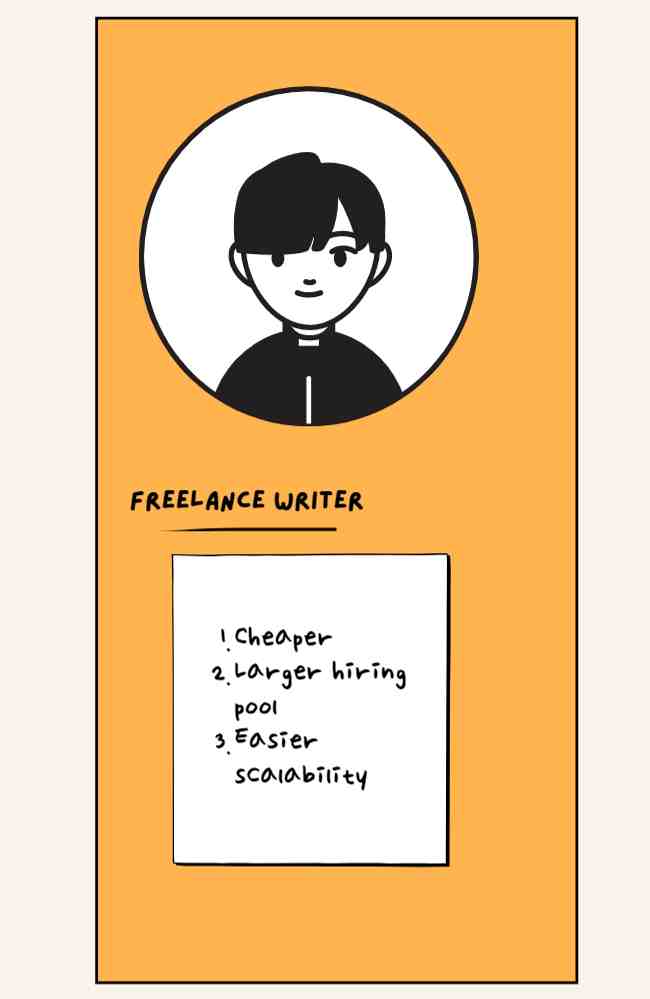
The cost, of course
With freelancing, there’s no way you’re paying $80,000 to get the same volume of content you’d get from an in-house staff writer on an $80,000 salary. It’d most definitely be cheaper, but the catch is the quality might not be the same, emphasis on might.
A bigger pool of writers to hire from
Freelancing opens up borders, so you get freelance writers from even the most remote places of the world. This broadens the pool of available writers you can choose from and, in effect, widens your chances of finding the perfect fit to match your brand voice and objectives.
You get the opportunity to pick and choose
When you want a team of writers with varied tones and writing styles, freelancing provides an easy getaway to reach your destination. Again, there are multitude writers to choose from on a budget, and because they’re freelance, it’s easy to hire and fire until you get the perfect writer. Not that I recommend hiring and firing anyway – better to test and weed out but more on that on the freelance writer hiring guide.
Freelance allows you to scale massively
There’s a limit on the amount of content an in-house writer or writing team can push out in unit time. If you want to scale your content writing massively, your best bet would be to assemble a team of freelance writers that you can conveniently staff up (or down) as your content creation needs demand.
What are the disadvantages of hiring a freelance writer?
Freelance writers can be a bundle to manage
Except you do your homework right with hiring and managing freelance writers expect to get hit with everything from missed deadlines to poor communication, bad copy, inattention to details, and everything else in between.
Freelancers are not exactly in touch with your brand values and objectives
The typical freelance writer is in touch with multiple clients at any point in time. Most are far disconnected from the underlying values, objectives, and consumer profiles of these clients. Instead, like mercenaries, they work to achieve very specific objectives – the things you layout in the writing prompt and project requirements.
The problem is without getting in tune with the deep context of your brand or target audience, it’s an almost tricky job to achieve these objectives. Most fail at it, so you get excellent copy that’s out of touch with your brand or target audience.
You need to sieve thoroughly to get good freelance writers
The barrier for entry into the freelance writing market is almost zero. Virtually anyone, English speaker or not, can set up shop and claim to be the best freelance writer of our generation on the many available freelance websites today (I’m looking at you, Fiverr).
Only a few are worth their onions, but paradoxically these exceptionally good freelance writers get buried in a murky sea of quacks and half-baked copywriters. So, while it’s true that there’s a literal sea of freelance writers to choose from, finding the good ones can pan out to be a tricky and time-consuming endeavor.
Communication is a barrier
Busy schedules, differences in time zones, unprofessionalism on the part of the freelance writer, there’s a lot that can affect communication when you’re dealing with a freelance writer.
Even when a communication line is secured, there’s no guaranteeing that that communication will be effective because, let’s face it, when you’ve got more than twenty masters to serve, chances are that some will get the shorter end of the stick.
If you wanted a bit of the freelance experience paired with some of the advantages of hiring a full-time in-house staff writer, you’d tow the agency route. But what specifically do you gain or lose with agency writers?
Advantages of hiring an agency writer
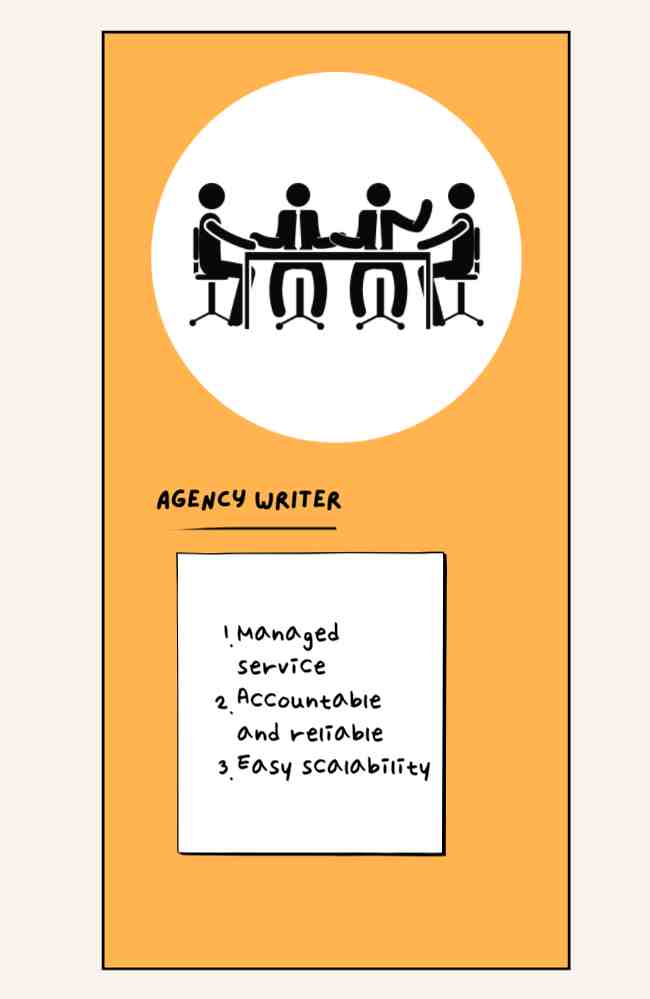
You get a full-on managed service
An agency writer is, for all relevant purposes, a freelance writer who interfaces with you via an agency or writer sweatshop, as I like to call them. The job of this intervening agency is to make sure writers under their concierge deliver to client requirements and expectations. With most agencies, all you need do is fill out your requirements and confirm payment – micromanaging the writer assigned to your task, enforcing deadlines and everything else falls under the purview of the agency’s administrators
Agencies provide a better-quality writing pool than freelance sites
The top writing agencies, the only ones you should ever trust with your money, have a thorough vetting process that only selects the crème de la crème of the content writing business. With this bunch, you’re sure you’re plugging into the top 10% of freelance writers, not the bottom quarter who are insanely good at optimizing their profiles so that they’re found ahead of what’s, in reality, the better crop of writers
As it is with freelance writers, writing agencies allow you scale
Sometimes even better than freelancers. It’s a pretty common practice to see a business owner outsource the entirety of their content development needs to a writing agency. If you were to do that the freelance route, you’d either have to give your select freelancer a lot of time or hire multiple freelancers to cut down the ETA.
Agencies work with multiple writers in writer teams, all managed by the agency themselves. All you need to do is provide your writing requirements, and it’ll be appropriately distributed to fit writers who can deliver on your objectives. It’s plug-and-play hiring with all the convenience you’d ever want.
Accountability and reliability
There’s better accountability and professionalism with content agencies compared to freelance writers. Unlike freelance writers who, for the most part, exist anonymously, content writing agencies are brands themselves with a reputation to uphold.
Consequently, the level of professionalism you get with the best ones is similar to what you’d get with a full-on in-house writer.
Most have dedicated customer service and dispute resolution desks. Many will provide a refund for sub-par content or something that does not meet expectations. The big guns in the business take the extra effort to provide clients (especially high-paying clients) with dedicated managers.
What are the disadvantages of hiring a writing agency?
Writing agencies can be expensive
Much like in-house writers, the best writing agencies, the kind that deliver on the advantages I’ve talked about, do not come cheap. Some are downright as expensive as hiring an in-house writer; in fact, in some cases, they charge more than in-house writers. What makes it worse is that the larger chunk of this money you’re paying is not actually going to the writer handling your project. Most agencies take huge cuts from your bill and end up paying writers what’s best described as meager salaries.
There’s little to no flexibility when working with writing agencies
With freelancers or an in-house staff writer, you can pretty much chip an extra detail on a whim or ask for a refresh of already developed content without jumping through any complex dispute resolution hoop. Same cannot be said about writing agencies. Once requirements are set, writing prompts delivered, and a contract is signed, it’s very difficult to make modifications without incurring extra (and significant) charges.
Agency writers may not have the technical expertise
Remember, these guys are mostly freelancers anyways, and like the average freelancer, they probably lack the technical expertise and insight to connect with your values and brand voice. Fair to note, however, that top-of-the-line agencies commit to hiring and training highly technical writers who can meet the technical needs of most brands. But be damn right sure that you’re going to pay top dollar for the services of these writers.
So, which should you choose?
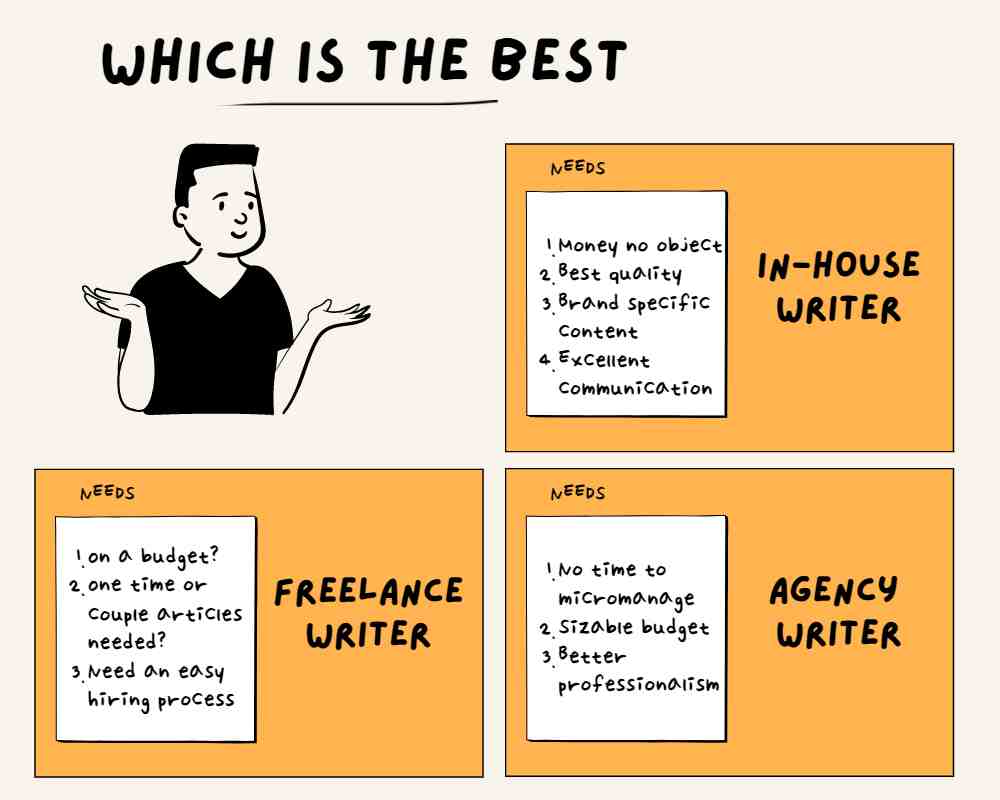
Now that you’ve seen what each offers, which is the best fit for your business?
Well, like I said earlier on, it’s mostly down to your needs. If you read through diligently, you’d have noticed that the advantages and disadvantages of each route to developing content work out to match specific content development needs.
If you’re a startup with a limited budget, for instance, you can go the extra mile to sieve out the best freelancers available for hire. That way, you do away with most of the disadvantages of hiring freelancers and reap the cost savings that come with this route.
If you’re a fledgling entrepreneur with little to no time on your hands but with a sizable operating budget, you can easily recruit a content writing agency and take the business of managing your writers off your shoulders.
If you’re a fully-fledged business with enough cash to spare, the best bet is going the in-house route. You want the best quality available, and since the expense is not an issue, you can hire one, two three writers dedicated to developing content for your brand. This is what most of the big brands you know and love do to satisfy their content development needs.
